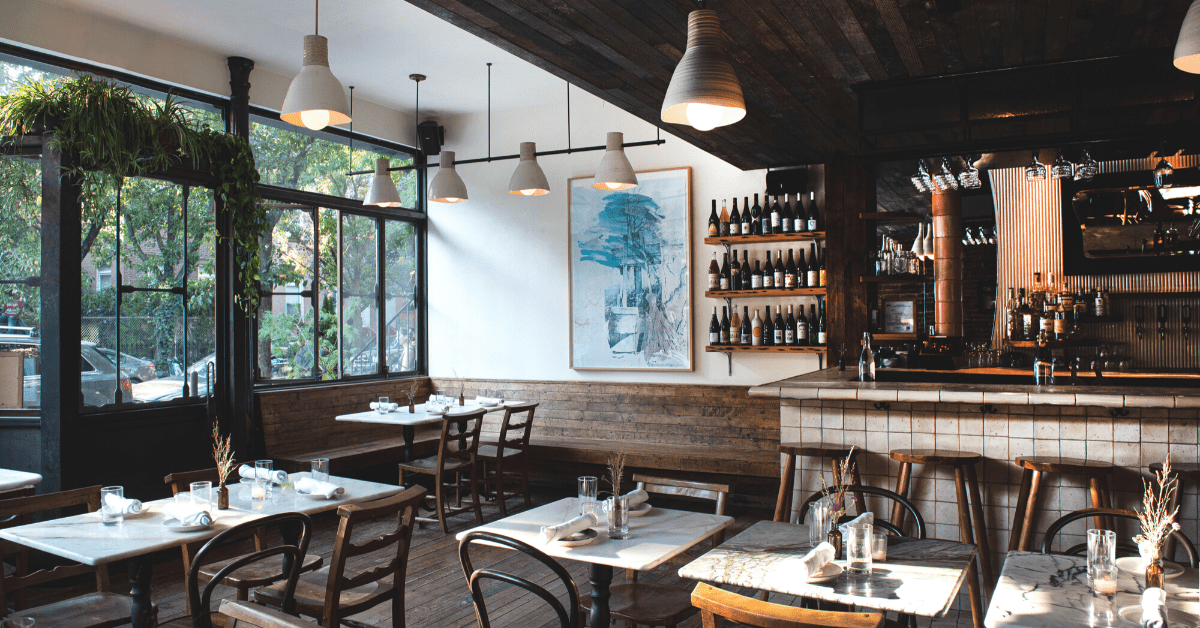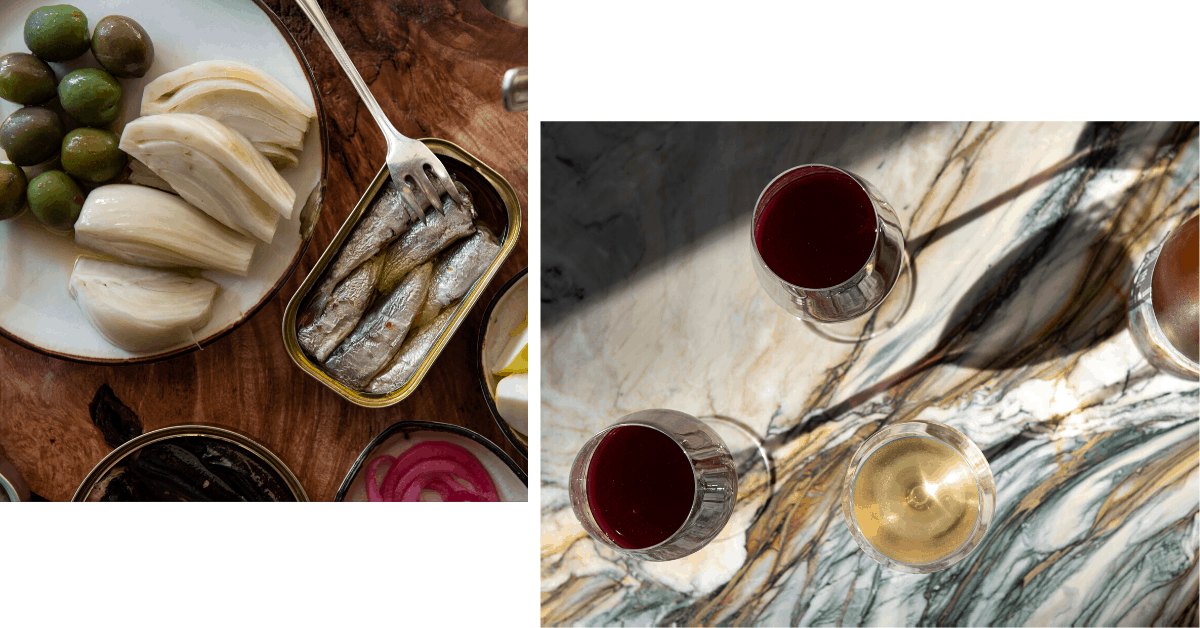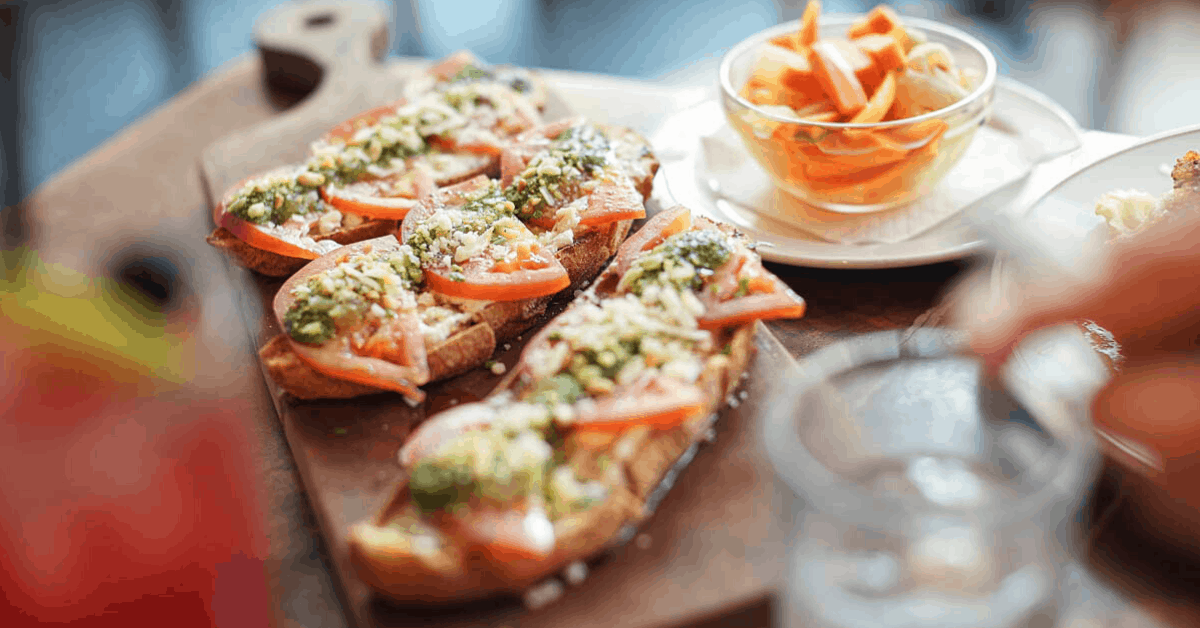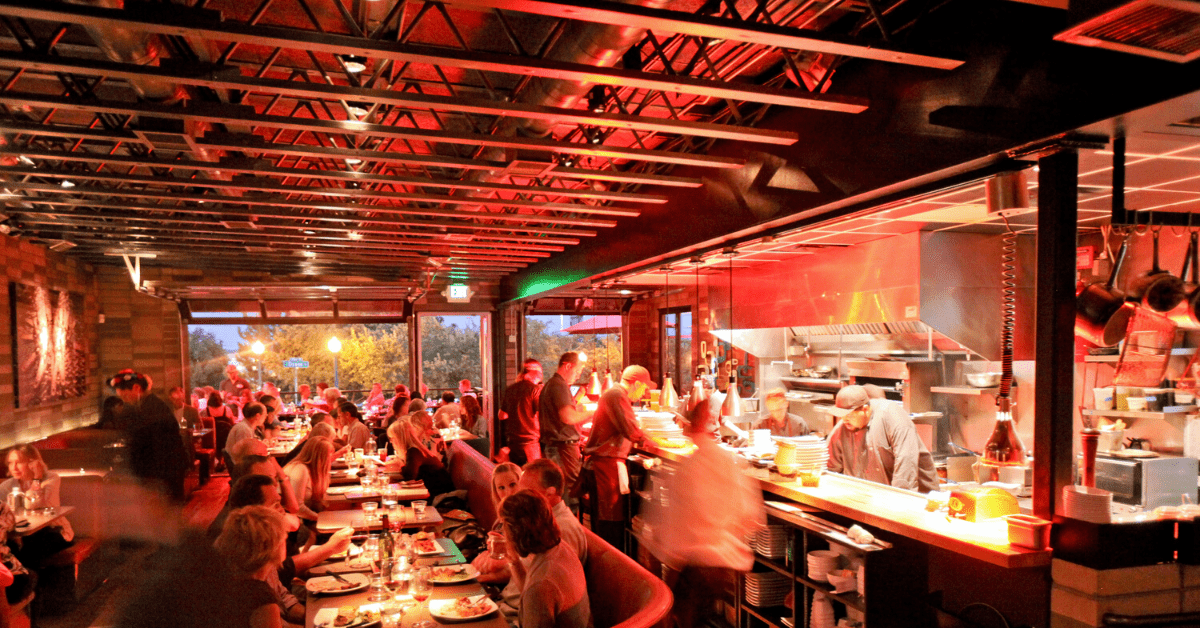Across the U.S., these mindful restaurants champion sustainability in both their design and cuisine.

In the world of restaurants, sustainability can be approached in many different forms. It could be something as simple as finding ways to avoid plastic or as complex as restructuring the entire food supply network.
Over the last decade or so in the U.S., these types of environmental questions have become almost as important as the food served. Across zero-waste wine bars and repurposed gas stations, these five restaurants explore how creating a sustainable business can be achieved in a variety of ways — from ground-breaking concepts to small decisions that culminate into big changes.
Rhodora: New York City’s first zero-waste wine bar
The idea of running a zero-waste restaurant isn’t exactly new, but previous attempts have struggled to balance the extra costs — such as large-scale composting and selecting ethical suppliers — that come with leaving no trace.
Opened in late 2019, Rhodora is hoping to change that as they look set to become New York’s most sustainable wine bar. Led by eco-conscious hospitality company, The Oberon Group, the bar features natural wines from a group of small-scale producers and pairs them with naturally packaged cheeses, oysters, and vegetarian snacks, sourced from like-minded businesses.

The Oberon Group deputy director and Rhodora co-owner Halley Chambers said it was “critical” for all businesses to move towards a sustainable future.
Chambers and The Oberon Group spent 10 months researching and adapting their Fort Greene location to create the processes necessary to achieve zero-waste status.
From sourcing wine in compostable boxes instead of bottles to stocking liquor brands that only use recyclable materials, there were a lot of challenging hurdles to overcome to achieve zero-waste status. The Oberon Group uses a dishwasher that only uses electrolyzed water instead of soap and partnered with ReCORK, a non-profit that turns old wine corks into a variety of consumer products, to complete their lifecycle.
“Our mission is to use Rhodora as a platform to talk about sustainability and serve as a community space for people to learn about how to mitigate their own climate impact,” Chambers said.
In making their zero-waste wine bar a successful venture, Chambers said that they hope to inspire people to make “smart purchasing choices” and develop better, more sustainable habits.
Uncommon Ground: One of Chicago’s oldest sustainable restaurants
Since 1991 when Uncommon Ground first opened its doors, its sustainable ethos has been clear. Founded by husband and wife Michael and Helen Cameron, the business opened as a small-scale espresso bar, sourcing coffee beans and other goods from local businesses. As the duo learned more about the negative aspects of the agriculture industry and food supply network, they decided to close the espresso bar and relaunch with an even greater environmental focus.
“In the early days, we were the first restaurant in Chicago that sourced food from local farmers for its seasonality, flavor, and nutrition,” Helen Cameron said.
“As we learned about problems with our conventional food stream such as bovine growth hormones and genetically modified organisms…we decided we didn’t want those types of ingredients in our restaurants.”
In 2007, the pair opened a second iteration of Uncommon Ground in Edgewater, a lakefront community in Chicago’s north. In 2011, Uncommon Ground was named the “Greenest Restaurant in America” by the Green Restaurant Association, and for good reason. The restaurant features a solar thermal system, which saves 10 percent on annual energy usage, uses hand dryers to replace single-use paper towels, and made the switch to LED lighting, one of the first restaurants in the U.S. to do so. Perhaps their most significant change was the creation of a certified organic rooftop garden, which produces more than 1400 pounds of fruit, vegetables, and herbs served in their dishes throughout the year.
“My husband and I don’t run a normal restaurant – we are uncommon for a reason,” Helen Cameron said.
“We find ways to make our idealism work. As a result, our community has supported us for over 29 years and it’s a very rewarding lifestyle.”
Founding Farmers: Washington DC’s farm-to-table alternative

Back in 2005, the North Dakota Farmers Union (NDFU) wanted to find a way to bring the local community closer to the region’s food growers. They created a hospitality group called the Farmers Restaurant Group, which oversees nine Founding Farmers restaurants and helps generate returns for the union’s 47,000 members.
These restaurants also help get locally made products into the hands of consumers, while promoting education on food production and the importance of doing so sustainably. In addition, the Farmers Restaurant Group is a signatory of the Cool Food Pledge, a worldwide initiative to reduce 25 percent of food-related greenhouse gas emissions by 2030.
The first Founding Farmers restaurant opened in Washington, D.C., built from the reclaimed pine of a dilapidated textile mill in North Carolina. Salvaging everything they could, the restaurant managed to divert or recycle more than 90 percent of its construction waste. The restaurant also purchases green power credits to cover 100 percent of its emissions from electricity usage.
Farmers Restaurant Group co-owner Dan Simons said their Washington D.C. flagship restaurant opened as the city’s first LEED Gold Certified eatery, recognized for its sustainable design and locally sourced ingredients.
“Every element is thoughtfully designed, from the efficient HVAC and lighting systems all the way down to the tables made from reclaimed wood,” Simons said.
Root Down: Denver’s wind-powered, vegetable-first restaurant
Situated in the eclectic surroundings of a repurposed gas station, Root Down is undoubtedly one of the U.S.’s best examples of sustainable dining. Led by Justin Cucci, executive chef and owner of the restaurant’s parent company Edible Beats, Root Down is a 100 percent wind-powered venue with a responsibly sourced menu that places vegetables at the center of almost every dish. Much of this fresh produce comes from the restaurant’s own sprawling organic garden. Cucci said Root Down was all about sourcing locally and responsibly.

“Over 50 percent of our ingredients are sourced within Colorado,” Cucci said.
“By doing so, we’re supporting over 55 local ranchers, farmers, growers, and food artisans.
“We (also) maintain a 6,000 square foot organic garden that supplies 20 percent of the seasonal herbs and vegetables for our restaurants.”
On top of this support for the local community, Root Down also manages to compost and recycle about 80 percent of the restaurant’s waste. Recycling is also at the forefront of Root Down’s interior, which has become a stylish and bustling setting that’s overflowing with funky upcycled furniture and materials.
“I’m a strong believer in one man’s trash is another man’s treasure,” Cucci said.
“Over the years, I’ve acquired three warehouses full of items from Craigslist and eBay… whether it’s 30 pink locker doors or 100 bowling balls, I’ll find a way to reuse them.”
Recycling old goods feeds into the message of sustainability that Edible Beats tries to promote to diners across its six restaurants.
“For these sustainability actions to truly be sustainable, culture is the glue that binds us and informs us,” Cucci said.
Tilth: Seattle’s original organic restaurant
Launched by award-winning chef Maria Hines in a leafy part of Seattle in 2006, Tilth was one of America’s first certified-organic restaurants. Throughout her career, Hines has demonstrated a steadfast commitment to working with sustainably produced ingredients.
Alongside her environmental goals, Hines also works with a variety of organizations including the James Beard Foundation, the Chef Action Network, and the PCC Farmland Trust advocating on a range of social issues. From fighting for increased access to food for low-income earners to campaigning for the mandatory labeling of GMO products, Hines is regarded as one of Seattle’s foremost educators on how food and sustainability intertwine with public health.
Inside Tilth, the local growers and producers Hines selects not only offer environmentally-friendly products, but also incredible flavors. From ethically-sourced chocolate and sustainably caught fish to artisan bread made entirely by hand, Hines only deals with those who share the restaurant’s environmental vision.
The restaurant itself was also built with an array of recyclable materials, alongside wood picked from sustainably managed forests. Hines herself handcrafted the restaurant’s chairs and made the curtains, while the kitchen recycles and composts the vast majority of its waste.



